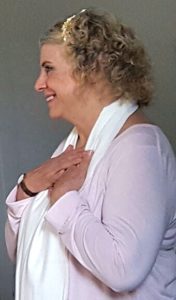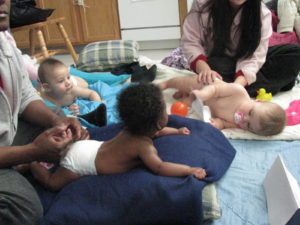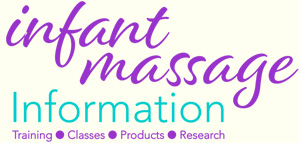Babies love to be touched, so it just makes sense that a structured way to touch infants, that fulfills their deepest needs for affection and love, should develop and be passed on from generation to generation in many areas of the world.
When my mother heard I was teaching massage, she told me: “Jody, I massaged you when you were a baby. I don’t know why. It just seemed like the right thing to do.” I suppose that early experience of touch is what made infant massage resonate so deeply for me.

The massage that I teach parents and instructors comes from India, where almost all babies are massaged, and includes Swedish massage strokes, reflexology and a bit of yoga, too. It was developed by Vimala McClure for her own babies, and shared in the book, Infant Massage, A Handbook for Loving Parents.
Back in 1980, when I was about to adopt my first baby, I contacted my friend, Vimala McClure, who I heard had written a book on infant massage. She sent me a copy of the first version of her book, Infant Massage: A Handbook for Loving Parents. I took oil from my kitchen, settled down with my new daughter, Olisa, and learned the massage and the wonderful pleasures of touch with my children. After I adopted my second child, and used infant massage to soothe our challenging introduction to each other, parents started asking me to teach them. Vimala invited me to come to Denver and learn to be an instructor and a trainer of infant massage. After a wonderful training in Denver, I finished my exam, did a co-training with another trainer, and began teaching families and instructors myself.
There is lots more to infant massage than the strokes. Vimala taught parents to start each massage by asking a baby’s permission to do the massage with them. As a parent rubs their oiled hands together and asks permission, s/he watches how the baby responds. A baby that is open to massage will have a relaxed body posture, make a connection with you through touch or through eye contact, along with showing receptivity in how they behave. If a baby pushes away, turns away, or looks away, or shows behaviors indicating they are too overwhelmed right now, it is best to respond to your baby’s current needs and do the massage later when the baby is feeling more receptive. This process helps parents learn to understand and recognize their baby’s language and needs and empowers a child to let other people know what their needs are .
The massage itself is a two-way process between parent and child. The parent should adjust the speed, duration and “touch” of the massage in response to their baby’s cues. It becomes a dance of communication and interaction. Ideally a dance of love.
The instructor in a parent-baby class or private session supports the parents to develop this dance. A CEIM/CIMI is trained to help parents position the baby for successful interaction, to help create an environment that promotes the development of loving bonds, good communication, and a relaxing time. There are many advantages in learning massage from a person, rather than a book, video or website. A skilled instructor can simplify the information for you and your family. She or he can easily solve struggles you might encounter through demonstration or guidance. Having an in-person guide, demonstrating on their doll, allows you to focus your attention on your baby rather than trying to interpret and apply information.

There are many benefits of massage. Parents tell us about these benefits in our classes: the baby who sleeps through the night for the first time, the great poop that constipated baby had on the way home from class, how a parent feels closer to their child, how a father feels like an important part of his child’s life now.
The reduced stress for both mother and baby after a massage is well-documented in studies. Depressed mothers who learned to massage their baby, along with getting group support, found themselves feeling less depressed and their babies were more responsive in their interactions as a result. A baby who is massaged often seems to change their sleep patterns: to sleep deeper in the first part of the night, and wake up more alert and awake. There are indications that massage can affect the child’s immune system helping them resist illness and have a more robust immune system. We know there is a drop in stress hormones for the baby soon after the massage, and that the parent also experiences a reduction in stress.
You can find out more about the research on infant massage in Infant Massage Info’s Documented Benefits and Research sections.
